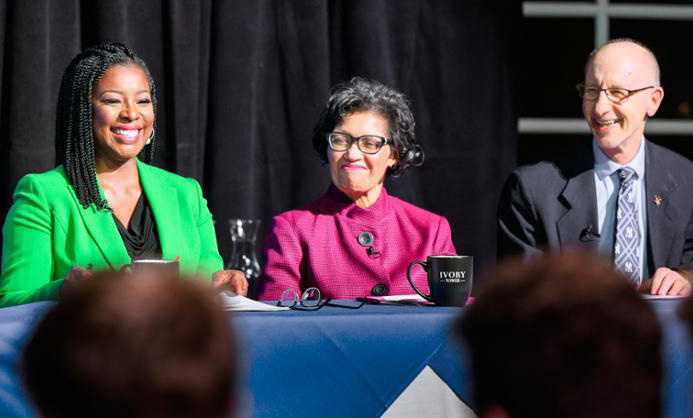
Common Ground hosted WCNY PBS on Wednesday, Feb. 28 in the Fillius Events Barn.
WCNY PBS recorded its first ever On the Road edition of Ivory Tower. This series evaluates politics and current events from students’ perspectives by recording at local colleges and universities.
The panel consisted of Hamilton Professor Ty Seidule, Colgate Professors Nina Moore and Chad Sparber, Utica College Professors Luke Perry and Rick Fenner, and Onondaga Community College Professor Tara Ross. Professor emerita Barbara Fought of Syracuse University led the Q&A session.
David Chanatry ’80, a journalism professor at Utica University and the director of the New York Reporting Project, regularly hosts Ivory Tower and moderated the event.
The event focused on four topics: diversity, equity, and inclusion (DEI), in vitro fertilization (IVF), sanctuary towns and military recruiting. Each topic was discussed for approximately 15 minutes.
Chanatry began the discussion by asking the panelists if colleges and businesses should get rid of DEI initiatives. Sparber responded first, remarking that DEI initiatives should be scaled back, but not completely eliminated. Moore responded to Sparber, asserting that opponents of DEI want to preserve the status quo. Likewise, she noted that people are afraid to use the wrong term and say the wrong thing, leading them to not participate in discussions. Seidule argued that DEI initiatives have been successful in the military. In the early 1970s, only .2 percent of military officers were Black while today, 9 percent of military officers are Black. Perry then expressed that since race is the most politically divisive issue in the country, it should be taken into consideration policy wise. He did maintain that implementation of DEI initiative matters and there should be an institutionalized culture where people are more empathetic.
The next topic explored was the recent Alabama Supreme Court decision arguing that embryos are children. This decision is relevant not only to women seeking to get an abortion, but also couples who struggle conceiving and turn to IVF. Fenner first made the point that politicians do not take into account ethical legal implications of the definition of when life starts. He expects there to be detrimental long-term consequences of the Alabama decision, which Moore echoed.
Moore stated that “the fall of Roe v. Wade threw out the window any standards by which any law could be judged when it comes to conception.” The overturn of Roe v. Wade thus allows state lawmakers to make decisions on women’s reproductive rights based on their personal beliefs, which are often influenced by religion. Additionally, the overturn allows the 50 states to interpret women’s reproductive rights in 50 different ways. She also warned of future bans on commonly used contraceptives, like Plan B, that prevent a fertilized egg from attaching to the uterine lining.
The third discussion was about sanctuary towns, a hot-topic issue following New York City Mayor Eric Adams’ call for modifications to the city’s sanctuary policy. Ross was the first to speak, making the point that New York City residents never had the opportunity to vote upon whether their city should become a sanctuary city. The Onondaga Community College professor also raised the question of whether America will become more isolationist and no longer be the country where immigrants are welcome by the Statue of Liberty.
Moore expressed that she is concerned that Americans associate migrants with crimes since there is no such thing as “migrant crime” or even “black crime.” Instead, she declared that crime is consistently shown to be correlated with poverty and socioeconomic status. Sparber also spoke about the relationship between crime and sanctuary cities. He claimed that without the fear of deportation, immigrants in sanctuary cities are more likely to report crimes and improve these cities’ safety.
To close the sanctuary city discussion, Seidule compared today’s 14 percent foreign born population to the 1920s when 15 percent of the country’s population was foreign born. In the 1920s, immigration was only slowed because of acts targeting “non-white” people (i.e. Italians and Greeks). The Hamilton professor then asserted that there is a growing nativist movement today as anti-immigrant sentiments rise.
The final discussion dealt with military recruiting. Chanatry began by saying that for the past two years, the military has failed to meet its recruiting quotas. Seidule, a retired United States Army brigadier general, first contended that there is always a recruiting crisis when the labor market is hot. To increase military recruitment levels, Seidule made three recommendations. One, that immigrants should serve, two, the standards for the volunteer army need to be rewritten, and three, MAGA supporters need to stop saying that the military is “woke.” Seidule did mention that military re-enlistment rates are very high, though.
Perry argued that the current high level of distrust in the government is a significant factor to the low recruiting rates. He claimed that Millennials and Generation Z witnessed the failure of the U.S. government’s response to 9/11, the War on Terror, the Great Recession, and the COVID-19 Pandemic. Thus, young Americans do not want to sacrifice their lives for a country that has not served them, which Moore and Ross both agreed with.
The recorded episode was broadcasted on Friday, March 1 at 8:00 p.m. on the WCNY PBS channel on cable television.
























